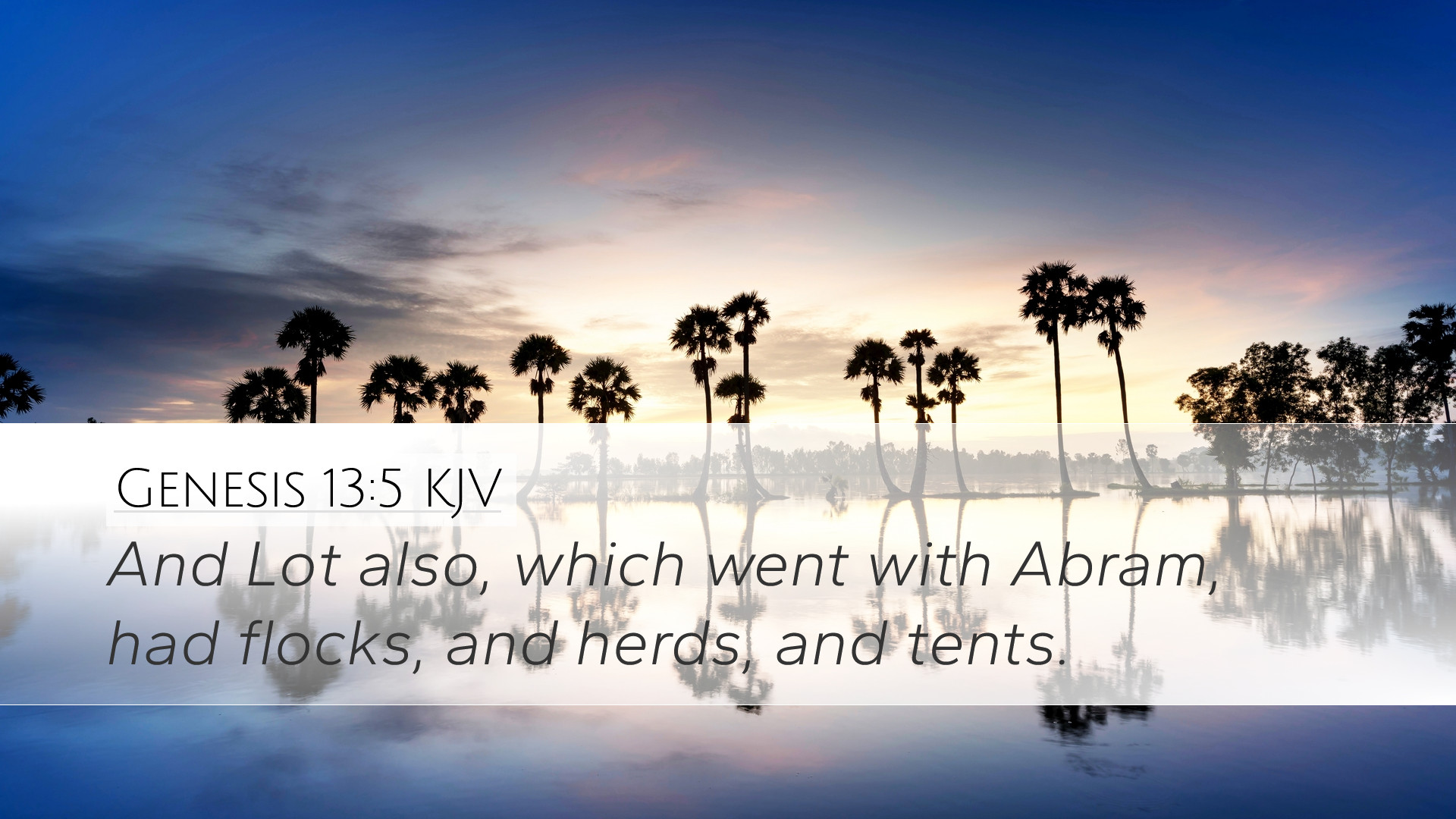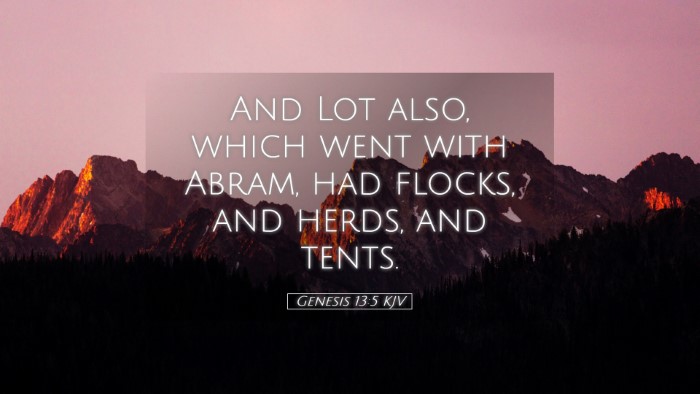Commentary on Genesis 13:5
Verse: "And Lot also, which went with Abram, had flocks, and herds, and tents."
Introduction
The journey of Abram (later Abraham) and Lot is significant in the early chapters of Genesis as it sets the stage for understanding the dynamics of family, wealth, and divine promise. This commentary synthesizes insights from public domain resources to reflect on Genesis 13:5, highlighting themes of prosperity, separation, and the consequences of choices.
Understanding the Context
In the preceding chapters, we learn that Abram, following God's call, leaves his homeland for a promised land. His journey brings blessings, not just to him but to Lot, his nephew. The mention of Lot in this verse underscores the close relationship and shared experiences between the two. Their wealth grows to such an extent that it leads to contention.
Matthew Henry's Insight
Matthew Henry notes that Lot's prosperity is a direct result of his association with Abram. He emphasizes that being with a man of faith enriches Lot, thus highlighting the spiritual significance of relationships. The blessings that accrue to Lot by being in Abram's company serve as an illustration of the impact of fellowship and the importance of aligning oneself with God’s chosen individuals.
Albert Barnes' Perspective
Albert Barnes focuses on the material aspect of this verse, commenting on the mention of "flocks and herds and tents." He suggests that this is indicative of considerable wealth in the ancient Near Eastern context. The physical abundance of both Abram and Lot is contrasted with the spiritual call they both have received, prompting readers to reflect on the spiritual implications of wealth and materialism.
Adam Clarke's Exegesis
In his commentary, Adam Clarke adds depth by discussing the implications of Lot's choice to accompany Abram. He reflects on how this relationship initially brings about mutual benefits, yet hints at future challenges. Clarke also details the types of livestock and the lifestyle represented by "tents," suggesting a nomadic existence that is both stable and precarious—indicative of the transient nature of their journey in faith.
Thematic Reflections
Prosperity and Divine Blessing
A recurring theme in the narratives surrounding Abram and Lot is that material prosperity often accompanies divine blessing. Both men, by adhering to God's directives and by virtue of their lineage, experience substantial wealth. However, this wealth comes with responsibilities and potential conflicts, as seen in the subsequent verses.
Contention and Separation
The growth of their flocks leads to strife among Abram's and Lot's herdsmen. This situation is notable as it forces Abram to confront the reality of their circumstances. The strife serves as a precursor to the separation that follows, a crucial moment that allows each man to pursue God's calling more independently. The verse illustrates how God may use physical blessings to lead individuals toward deeper spiritual insights, underscoring the tension between earthly and heavenly riches.
Spiritual Implications
Faithfulness and Covenant
Throughout the biblical narrative, divine promises are often intertwined with the faithfulness of the individuals involved. The success of Lot, while depicted positively, ultimately raises questions about loyalty and dependence. As Genesis progresses, the choices they make will reflect their relationship with God and the covenantal promises that undergird their circumstances.
Lessons for Modern Believers
For contemporary pastors and theologians, Genesis 13:5 serves as a poignant reminder to consider how worldly success aligns with spiritual fulfillment. It challenges believers to reflect on their relationships and the influence they have on one another’s journeys in faith. The blessings bestowed upon Lot illustrate the importance of proximity to God’s plans, while also cautioning that material prosperity can lead to trials that test faithfulness.
Conclusion
Genesis 13:5 encapsulates a significant moment in the lives of Abram and Lot, representing themes of prosperity, choice, and divine guidance. The insights from Matthew Henry, Albert Barnes, and Adam Clarke enrich our understanding of this passage, urging us to evaluate our own lives in light of God's blessings. As modern readers, we are called to navigate the delicate balance between material blessings and spiritual pursuits, recognizing that true wealth lies in our relationship with God and the stewardship of His blessings.


